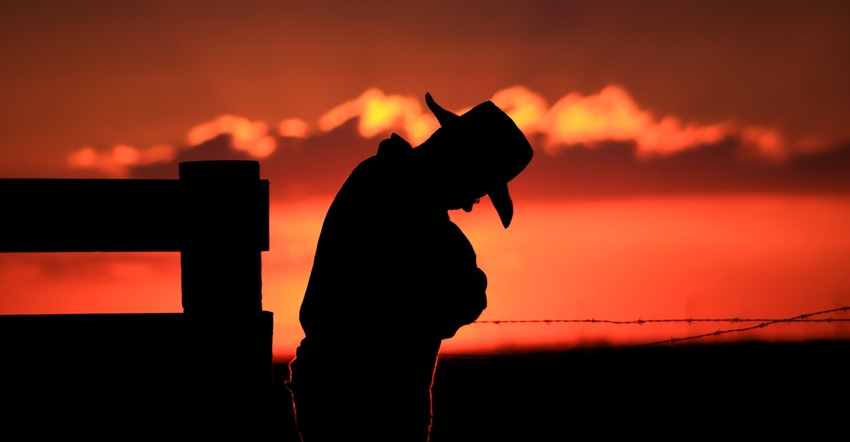May 17, 2022

“That is not how my dad did it” was a common phrase I heard as a grain originator when presenting new options for marketing grain to my producers. Many were stuck in their ways and did things just as their dad and grandpa did.
I am not saying the old ways of how our elders did things were wrong, but sometimes we need to update to modern practices and a changing economy. As producers, one thing we do need to update would probably surprise you. It’s not marketing or buying a different flavor of equipment as our grandpa did. It’s how we manage our mental health.
Occupational hazard
Production agriculture is one of the most stressful, mentally challenging occupations there is. You can easily fit in the phrase, “It’s us against the world.” Mental health has reached a critical stage with post-pandemic impacts, which have been enhanced by natural disasters, extreme weather events, financial pressures due to fluctuating commodity prices, labor shortages, trade disruptions and other factors over the past several years.
Given these ongoing challenges, it’s no surprise that more farmers and farm families are experiencing stress and mental health concerns. We are all professionals when it come to the financial, agronomic and livestock enterprises of the farm and ranch. But are we on top of taking care of the one thing that really matters? That would be ourselves.
The stigma around mental health in rural communities is discouraging, as it keeps us isolated and out of touch. We don’t want to talk about the issues we are dealing with or struggles we are having because that might be a sign of weakness or bring embarrassment.
What happens is we shut out friends and family, and don’t realize others may be going through the same thing. All this does is put up a wall for people who may really need help and limit their willingness to find help. Here are a few warning signs to identify someone who may be at risk:
persistent worry and fear
apprehension and uneasiness
avoidance of others
lack of interest or pleasure in activities
problems sleeping
substance misuse
unexplained changes in physical appearance or behavior
If you notice one or more of these signs in someone you know, tell that person you’ve seen changes in their habits. Don’t wait for the person to ask for help. If they’re willing to reach out, encourage them. Try not to compare their challenges to someone else’s or minimize what they’re going through. What matters most is showing genuine care and sympathy, and listening without judging the person for the position they are in.
As a community, we need to make it OK to talk about stress and other mental health issues. Remember, it’s OK to be not OK. If you are having trouble managing stress or depression, reach out to someone and talk about the issues you are dealing with. Talk with someone you feel comfortable with. Your banker or agronomist will be glad to listen. Or stay a little longer after church to speak to your clergy. Most importantly, speak with your family to make sure the ones who care about you the most know what is going on.
We need to end this stigma in our industry, as we cannot continue to manage our mental health as our dad or grandpa did years ago. With everyone advocating and bringing awareness and priority to mental health, it will show farm families it is OK to talk about tough things and will make the industry stronger. Because with everything, we are stronger together.
Wilcox is an instructor with the North Dakota Farm Management Education Program, which provides learning opportunities in economic and financial management for those in farming and ranching. Visit ndfarmmanagement.com, or contact Craig Kleven, state supervisor for agricultural education, at [email protected] or 701-328-3162 for more information.
You May Also Like




